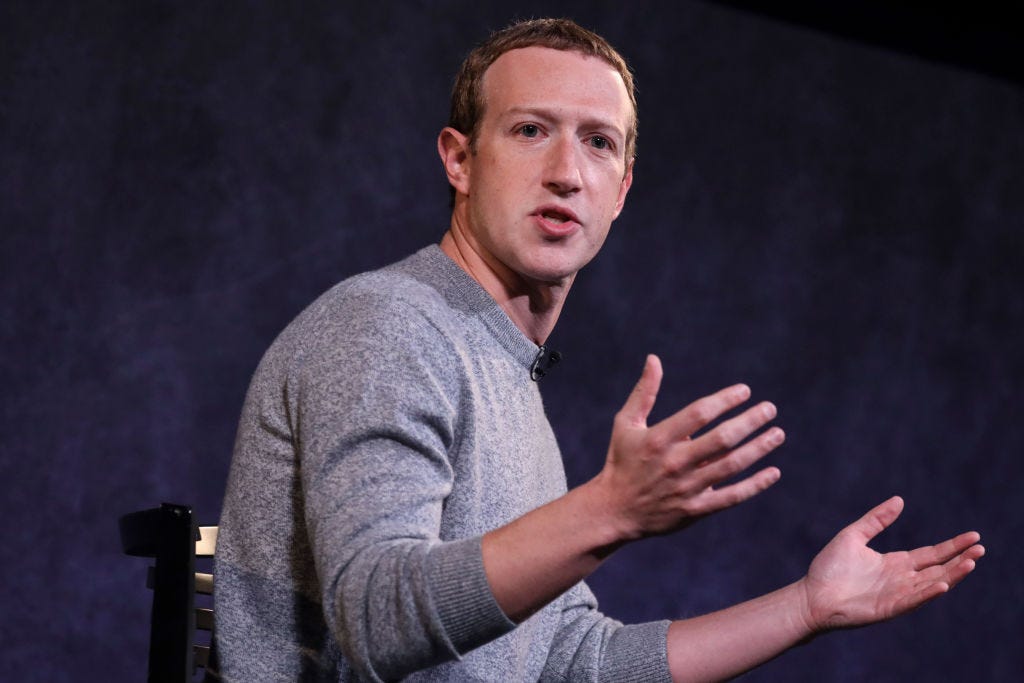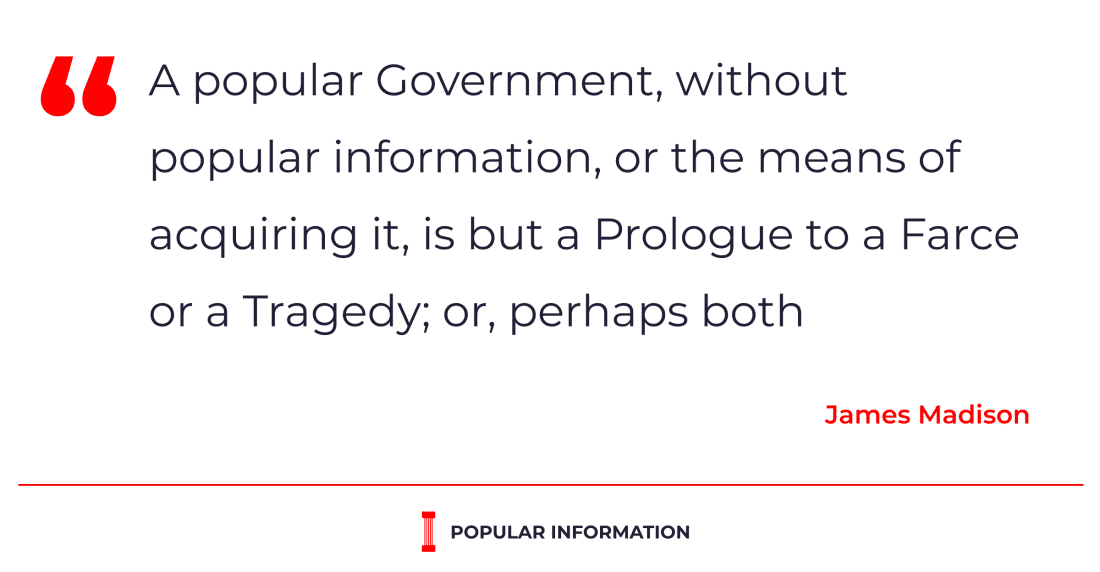 |
Facebook CEO Mark Zuckerberg speaks. (Photo by Drew Angerer/Getty Images)
Last Wednesday, Facebook CEO Mark Zuckerberg appeared on Fox News to defend his decision not to remove two Facebook posts by Trump about mail-in voting. The posts clearly violated Facebook's policy prohibiting misinformation about voting methods. Zuckerberg said Trump's posts would stay, but the company would take down posts by Trump that advocated violence.
We do have clear policies and if anyone violates them — whether you're a high-ranking government official like the president or anyone on our platform — we do have to take action if people are doing things that are going to promote violence.
Two days later, Trump posted a message to Facebook that clearly advocated violence.
These THUGS are dishonoring the memory of George Floyd, and I won’t let that happen. Just spoke to Governor Tim Walz and told him that the Military is with him all the way. Any difficulty and we will assume control but, when the looting starts, the shooting starts. Thank you!
On Friday afternoon, Zuckerberg issued a lengthy statement announcing that Trump's post would not be removed.
I know many people are upset that we've left the President's posts up, but our position is that we should enable as much expression as possible unless it will cause imminent risk of specific harms or dangers spelled out in clear policies... Although the post had a troubling historical reference, we decided to leave it up because the National Guard references meant we read it as a warning about state action, and we think people need to know if the government is planning to deploy force.
What Zuckerberg describes as a "troubling historical reference" is the use of the phrase "when the looting starts, the shooting starts" by notorious racists like Miami Police Chief Walter Headley, who presided over a violent crackdown on the city's black community.
Zuckerberg claims the post was allowed because it was a "warning about state action." But Facebook's Community Standards on violence, as Zuckerberg indicated on Fox News, contain no exemptions for heads of state.
Zuckerberg's decision was particularly unpopular with a group of people the billionaire CEO cannot afford to alienate: his employees. On Monday, Facebook engineer Timothy Aveni publicly announced he was quitting in protest:
I'm resigning from my job at Facebook.
For years, President Trump has enjoyed an exception to Facebook’s Community Standards; over and over he posts abhorrent, targeted messages that would get any other Facebook user suspended from the platform. He’s permitted to break the rules, since his political speech is “newsworthy.”
“when the looting starts, the shooting starts.”
Mark always told us that he would draw the line at speech that calls for violence. He showed us on Friday that this was a lie. Facebook will keep moving the goalposts every time Trump escalates, finding excuse after excuse not to act on increasingly dangerous rhetoric.
I cannot keep excusing Facebook’s behavior. Facebook is providing a platform that enables politicians to radicalize individuals and glorify violence
Aveni's explanation for his resignation is consistent with Popular Information's reporting over the last two years. Again, and again, and again, Facebook has bent, ignored, or changed its rules to accommodate Trump.
Aveni is not the only Facebook employee to take offense to Zuckerberg's latest decision to accommodate Trump. On Twitter, numerous employees took the extraordinary step of criticizing their CEO, including several high-ranking executives.
The protests went beyond tweets. On Monday, hundreds of Facebook employees staged a virtual walk-out, refusing to work in protest of the Zuckerberg's decision on Trump's inflammatory posts.
The internal revolt is a result of Facebook's contradictory messages colliding. Facebook has pitched itself to employees, mostly in the San Francisco area, as a progressive and inclusive company. Meanwhile, Facebook's powerful DC office, which controls much of the company's public policy, is run by Republican operatives focused on placating Trump.
A tale of two phone calls
Before making the decision to allow Trump's post advocating violence to remain on Facebook, Zuckerberg called Trump. Axios reported that the call "was described by both sides as productive."
Zuckerberg did not consult with any civil rights groups before making the decision last week. Instead, on Monday, he announced that Facebook would donate "$10 million to groups working on racial justice."
On Monday, Zuckerberg held a call with civil rights leaders. It seemed less productive. After the call, the participants — Rashad Robinson of Color of Change, Vanita Gupta of the Leadership Conference, and Sherrilyn Ifill of LDF — released this statement:
We are disappointed and stunned by Mark’s incomprehensible explanations for allowing the Trump posts to remain up. He did not demonstrate understanding of historic or modern-day voter suppression and he refuses to acknowledge how Facebook is facilitating Trump’s call for violence against protesters. Mark is setting a very dangerous precedent for other voices who would say similar harmful things on Facebook.
"No amount of money can absolve the fact that his inaction on Trump's tweets is directly putting Black lives and our very democracy in the line of fire," Gupta tweeted.
The Oversight Board checks out
Facebook has promised that its most consequential decisions will be reviewed by a new independent Oversight Board. But, in the wake of Zuckerberg's decision, the Oversight Board announced that it was not ready to consider cases.
In an internal communication to staff, Facebook said it had been unable to purchase the Oversight Board laptops. Even when the board begins to operate, it will initially only consider cases where Facebook removes content — not cases where Facebook declines to act.
Meanwhile, one of the Oversight Board co-chairs, Michael McConnell, "is facing criticism from numerous student groups and instructors after saying the N-word" during a Stanford Law class "while quoting from historical source material." The class was being recorded on Zoom, and McConnell turned the recording feature off before using the racial slur.
McConnell said he "made the pedagogical choice" to use the N-word "with the intention of teaching the history of our founding honestly."
Stanford's Black Law Students Association blasted McConnell's explanation. "Ahmaud Arbery is our history. Breonna Taylor is our history. George Floyd is our history. White men refusing to stop saying [the N-word] is our history," the group said in a statement.
McConnell said he would not use the word in class again.
Zuckerberg won't budge
In a companywide meeting on Tuesday, Zuckerberg told staff "he won’t change his mind" about Trump's posts. According to Bloomberg, Zuckerberg said that "he and other members of the company’s policy team couldn’t justify saying that the message clearly incited violence, which means it didn’t break Facebook’s rules."
Zuckerberg described the decision as "tough" but "very thorough."
Many Facebook staffers were frustrated and angry. "Why are the smartest people in the world focused on contorting and twisting our policies to avoid antagonizing Trump?" one Facebook employee asked.
Zuckerberg is taking a massive gamble in prioritizing the company's relationship with Trump over its workers. As a large tech company based in Silicon Valley, Facebook is in intense competition for talent. If the company is unable to retain or attract highly-skilled employees, its business will suffer. Zuckerberg appears confident that, over time, his employees will get over it.
We'll see.
Thanks for reading!
 |





